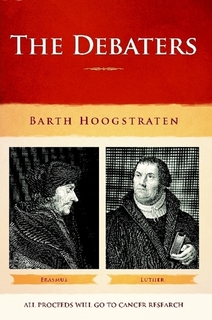THE DEBATERS by Barth Hoogstraten (Lulu Publishing, rev. June 2015, supplied by Amazon); $29.52. Reviewed by DANIEL J. STOLLENWERK.

The late 15th century was a turbulent time in Europe. An explosion of printing presses was revolutionising communication as even the Internet would not do 500 years later. Columbus had just discovered whole new worlds. Copernicus was about to claim the Earth was not the centre of the universe. Evil spirits and sorcery dominated much of peasant life. And the plague kept popping up its ugly head, claiming in 1483 the mother of the 17-year-old Dutch genius and bastard son of a priest, Desiderius Erasmus, the same year that the German Martin Luther was born to an educated mother and harsh disciplinarian miner father.
In a lengthy fictitious account, celebrated oncologist and amateur historian Barth Hoogstraten weaves together the lives of these two dynamic medieval personalities of intriguing father complexes.
Although the dialogues are often strained and the similes cliché, still The Debaters draws the reader into the medieval world of unsanitary inns, friendly bottles of wine, the almost haphazard way that the two men gain their education and ultimately the manner in which they deal with the gross corruption, wealth, debauchery, violence and
sheer stupidity of the Roman Catholic hierarchy.
Erasmus published In Praise of Folly. Luther posted his 95 theses. Both sought dialogue. Rome declined each, appealing instead to authority, maligning Erasmus and excommunicating Luther.
Luther entreated Erasmus to join the German reform movement. Erasmus refused, earning not only the vitriol of Luther, who accused him of fence-sitting, but also the rancour of the Dominicans at Louvain who blamed him for instigating the movement in the first place.
In the end, however, Erasmus comes out looking better than Luther, who called on his followers to hate “that viper”
Erasmus, “Christ’s most bitter enemy”. Erasmus refused to reply.
But if loathing for the Dutch scholar seems almost childish, the elderly German reformer’s diatribe against the Jews appears sickeningly prophetic: Jews, he wrote, “are full of the devil’s faeces … in which they wallow like
swine. The synagogue is a defiled bride, an incorrigible whore, an evil slut”.
His advice to the princes regarding the Jews who were not persuaded by Luther’s purified Christian preaching? “Set fire to their synagogues — in honour of our Lord. Raze their houses, burn their books, abolish for them safe conduct on our highways.”
In view of the events of Germany some 400 years later, Hoogstraten’s summary of Luther sounds rather weak. Luther was not a saint, Hoogstraten insists. But perhaps the reformer’s short temper, verbosity and steadfast opinions were necessary to take on the Roman Church of the day.
The reader, on the other hand, might rather be inclined to agree with Erasmus that both the Roman and Reformed
churches of the 16th century displeased him. Still, he would rather bear with the former until he sees a better, adding “it cannot help bearing with me, until I shall myself be better,” and concluding that “he does not sail badly who steers a middle course between several evils”.
Dan Stollenwerk is Head of the Faculty of Theology and Philosophy at St Peter’s College, Auckland.
Two great minds in a turbulent age

Posted in Reviews
Reader Interactions